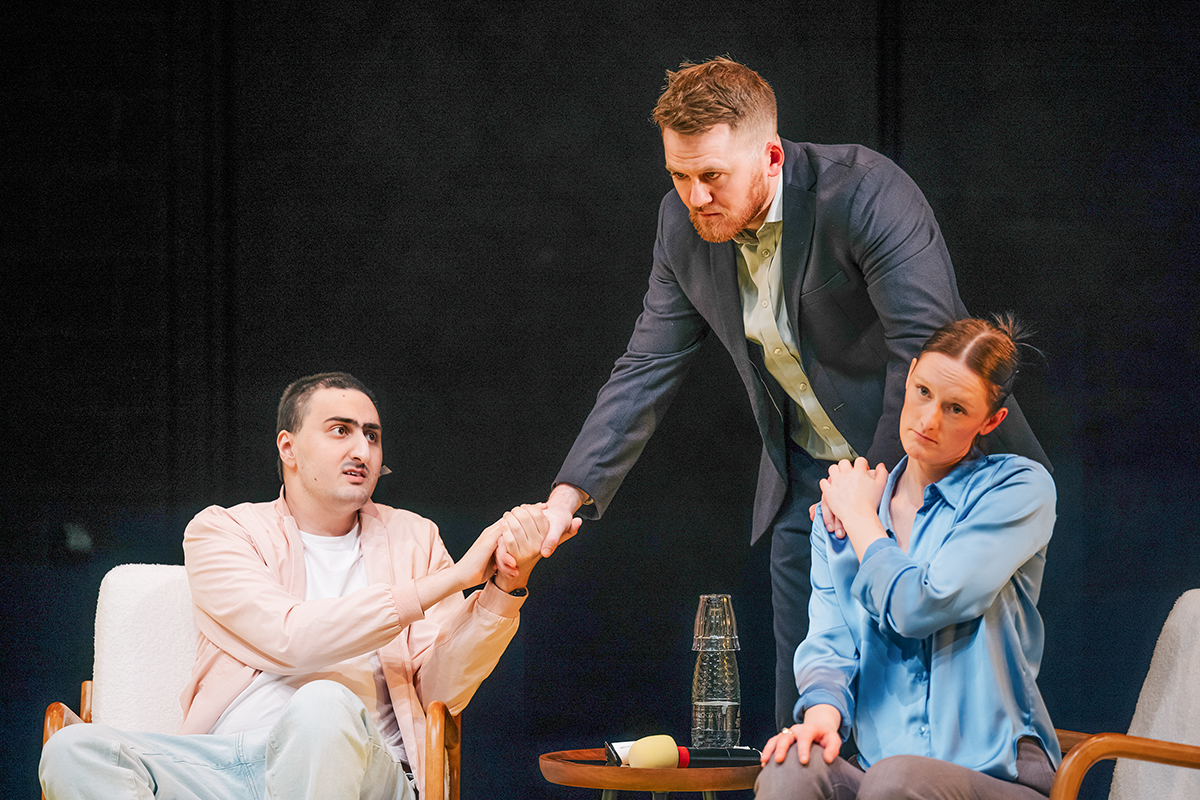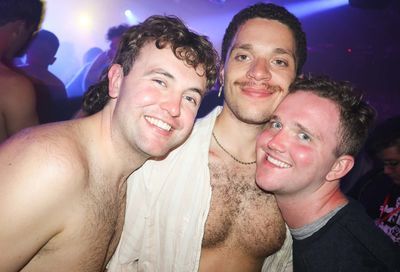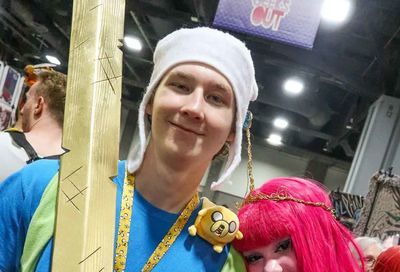Wrestling Demons
A blend of identity-angst and comment on what it is to think American, ''Chad Deity'' is a clever take on familiar themes
A semi-satirical distillation of the mercenary world of professional wrestling as recounted by a particularly ambivalent member of its fraternity, Kristoffer Diaz’s The Elaborate Entrance of Chad Deity is part indictment, part feverish dream. A blend of identity-angst, notes on the less-than-perfect melting pot and plenty of comment on what it is to be/think American – at least the kind that watches wrestling – Chad is a clever theatrical take on familiar themes.
Narrating with wit and intensity, Mace is the veteran wrestler destined always to be the villainous foil and fodder for the star attraction. Though he seems half-proud of his unsung but essential role, the rest of him bemoans his obligation to a sleazy and bigoted boss, known as EKO, and the posturing current champion, Chad Deity. He describes the end of this uneasy peace, which arrives when he persuades EKO to give his charismatic friend, VP, a chance to wrestle. Before long, Mace and VP find themselves alternately pummeled and carried aloft by a force far greater than any human opponent: the insatiable demands of the market.

”Chad Deity” at Woolly Mammoth
(Photo by Stan Barouh)
Delivering a sustained and powerful performance, Jose Joaquin Perez captures all that is genuine and vulnerable in Mace – even if one continues to wonder how he could be surprised by the mores of his chosen profession. Angry, undermined but ever canny, he is a man torn between honor (to his roots and his personal creed) and the well-honed survival instinct of the economically challenged.
Perez keeps this tension bright and immediate even when Diaz, as he occasionally does, hangs on for more than he needs to. As the finale arrives, Perez ignites with a credible fury even if his emotionally urgent delivery makes capturing every word a challenge. Perez shows us with skill what Diaz delivers well: a complex man whose anger both fuels and betrays him.
But, again, the tale of an underdog whose moral outrage ends up feeding versus shaming the machine he reviles is hardly new. What Diaz brings is not so much the revelation of such realities, but rather the unique prism of the wrestling world and an original and well-drawn underdog. Mace is not a cliché; his inner life – which grows directly from a childhood that speaks of innocence and happiness — is palpable. Diaz captures this with clarity, Perez delivers it with credibility and designer Jared Mezzocchi suggests it, via projection, with poignancy.
As VP, Mace’s buddy, Adi Hanash seems a tad out of his comfort zone in channeling this neighborhood ”player” and some of his patter is lost in his speed of delivery but much is carried by his natural presence. Unfortunately, Diaz’ crystalline vision of Mace doesn’t extend to VP who seems written more as means to an end than a dimensional character. Though he is sold on his easy charm and verbosity, Diaz quickly reduces VP to a distracting reticence that is broken only by his rather strange out-bursts while in character as a wrestler. By the time he rebels against EKO’s aggressively non-PC business agenda, it feels empty of impact.
As the main attraction, Shawn T. Andrew has plenty of fun with his Chad Deity and just about manages the mild eccentricities Diaz writes into this happily co-opted professional. But, like VP, he feels somewhat neglected, despite the warmth and magnetism given him by Andrew. Even with Mace’s fevered recitation on Chad and his prowess, little is given of what drives this man outside the ring. Thus, Diaz keeps his energy for the larger themes and Mace, but he does so at the expense of a coloring that might have brought more poignancy and originality to the piece.



To Sept. 30
Woolly Mammoth
641 D St. NW
$30-$65
202-393-3939
woollymammoth.net
Arriving and departing like an arbitrary force of nature – at least in Mace’s imagination – EKO serves as promoter, MC and economic visionary. Wearing his rings with restrained flair, Michael Russotto gives his man memorable authority but the necessary smarm feels just a tiny bit more like the knowingness of the educated than the confidence of a hood in a suit. It’s a subtle difference that makes EKO ever so slightly less convincing; EKO can be in on his own jokes, but not those of Diaz.
Bringing the skill-set of the professional wrestler, James Long as various outlandish opponents, shows himself an accomplished physical comic and all-around scene-stealer. Fascinating to watch, he channels the reason even theater-going snobs might occasionally (if covertly) linger over the inanities of WWE: the chance to see near-naked amply-muscled men in acts of animal grace. And with three other actor/wrestlers appearing in various states of bare-chestedness and spandex, it’s a play as visual as it is visceral.
Support Metro Weekly’s Journalism
These are challenging times for news organizations. And yet it’s crucial we stay active and provide vital resources and information to both our local readers and the world. So won’t you please take a moment and consider supporting Metro Weekly with a membership? For as little as $5 a month, you can help ensure Metro Weekly magazine and MetroWeekly.com remain free, viable resources as we provide the best, most diverse, culturally-resonant LGBTQ coverage in both the D.C. region and around the world. Memberships come with exclusive perks and discounts, your own personal digital delivery of each week’s magazine (and an archive), access to our Member's Lounge when it launches this fall, and exclusive members-only items like Metro Weekly Membership Mugs and Tote Bags! Check out all our membership levels here and please join us today!



















